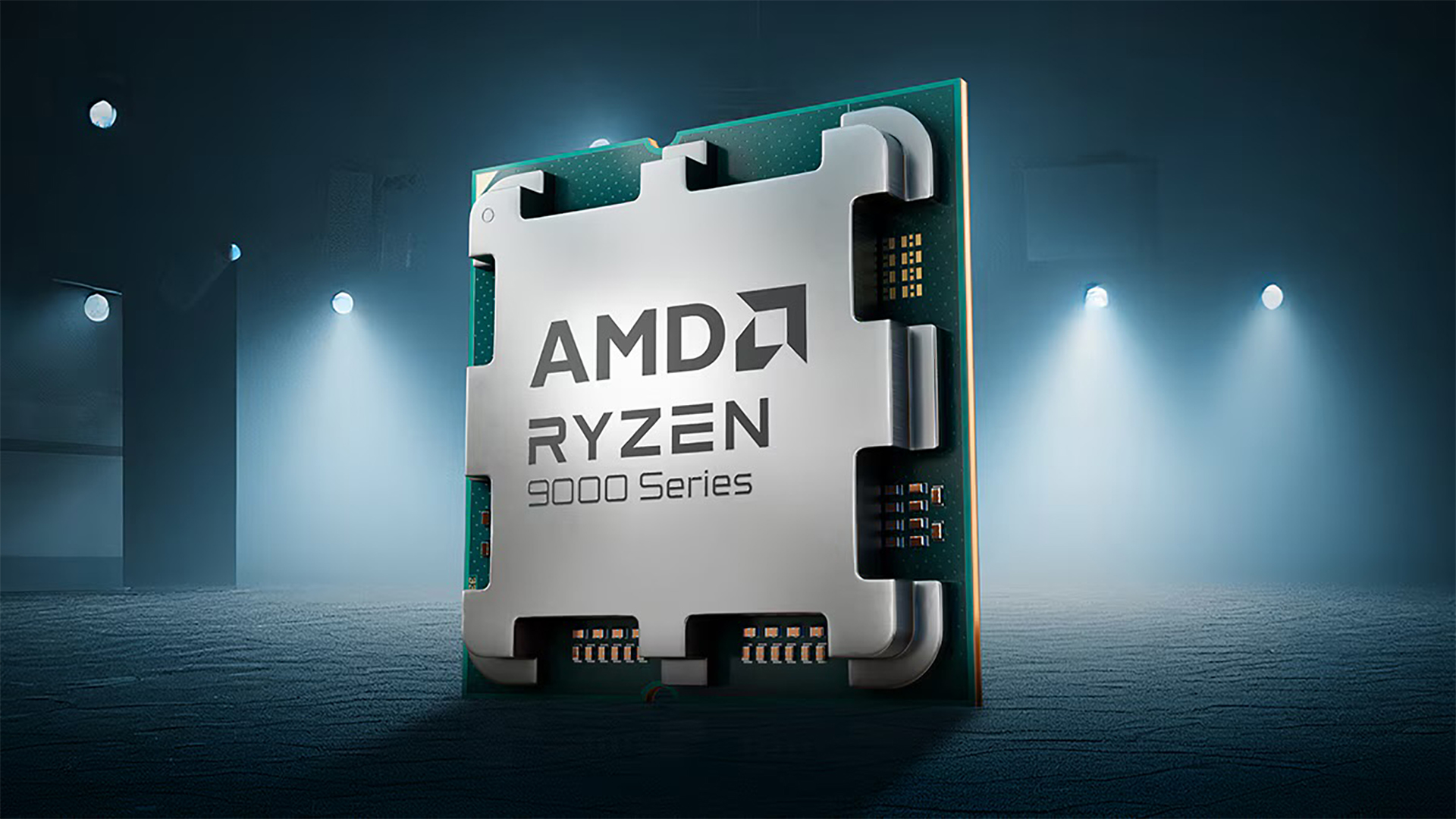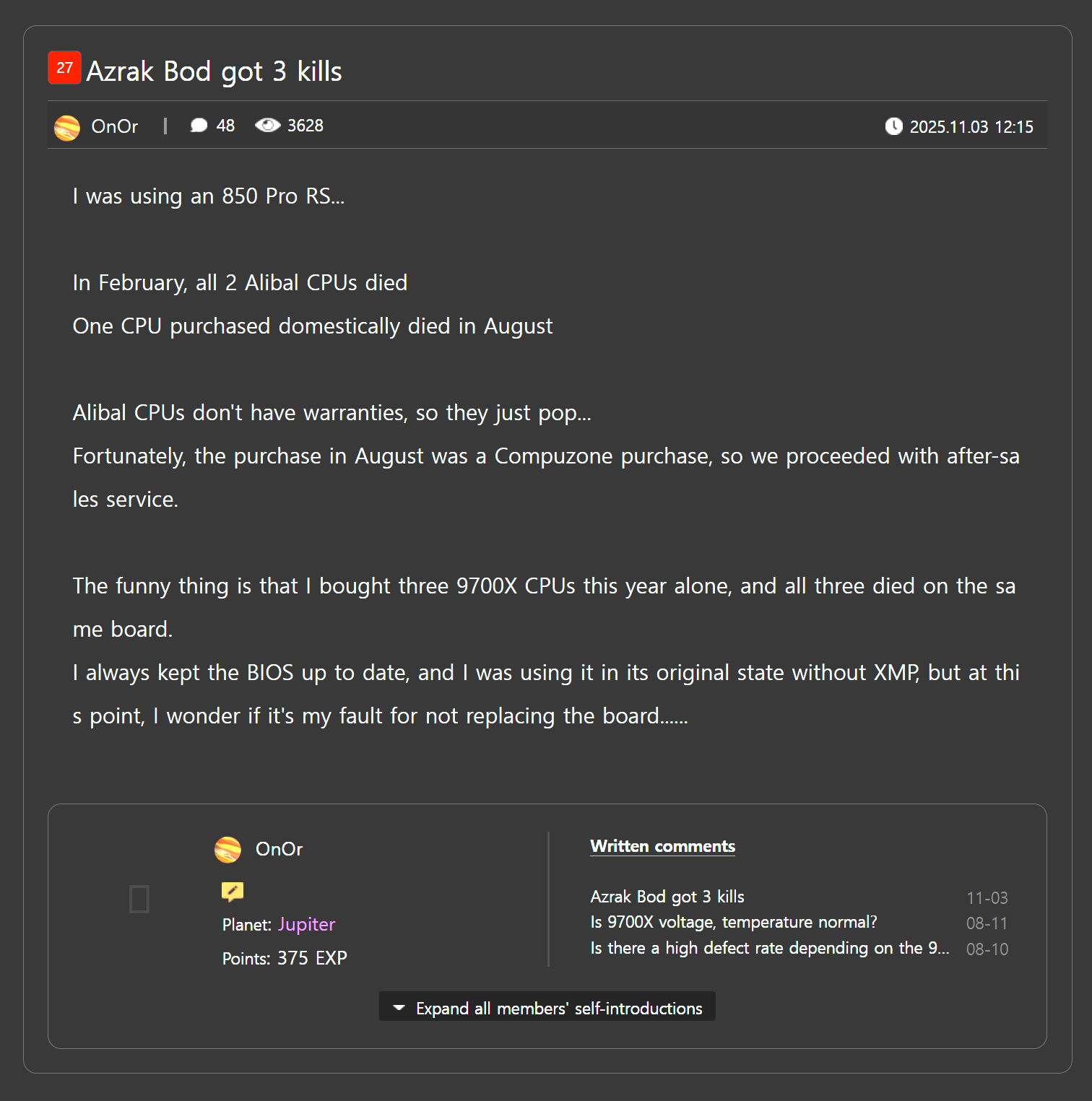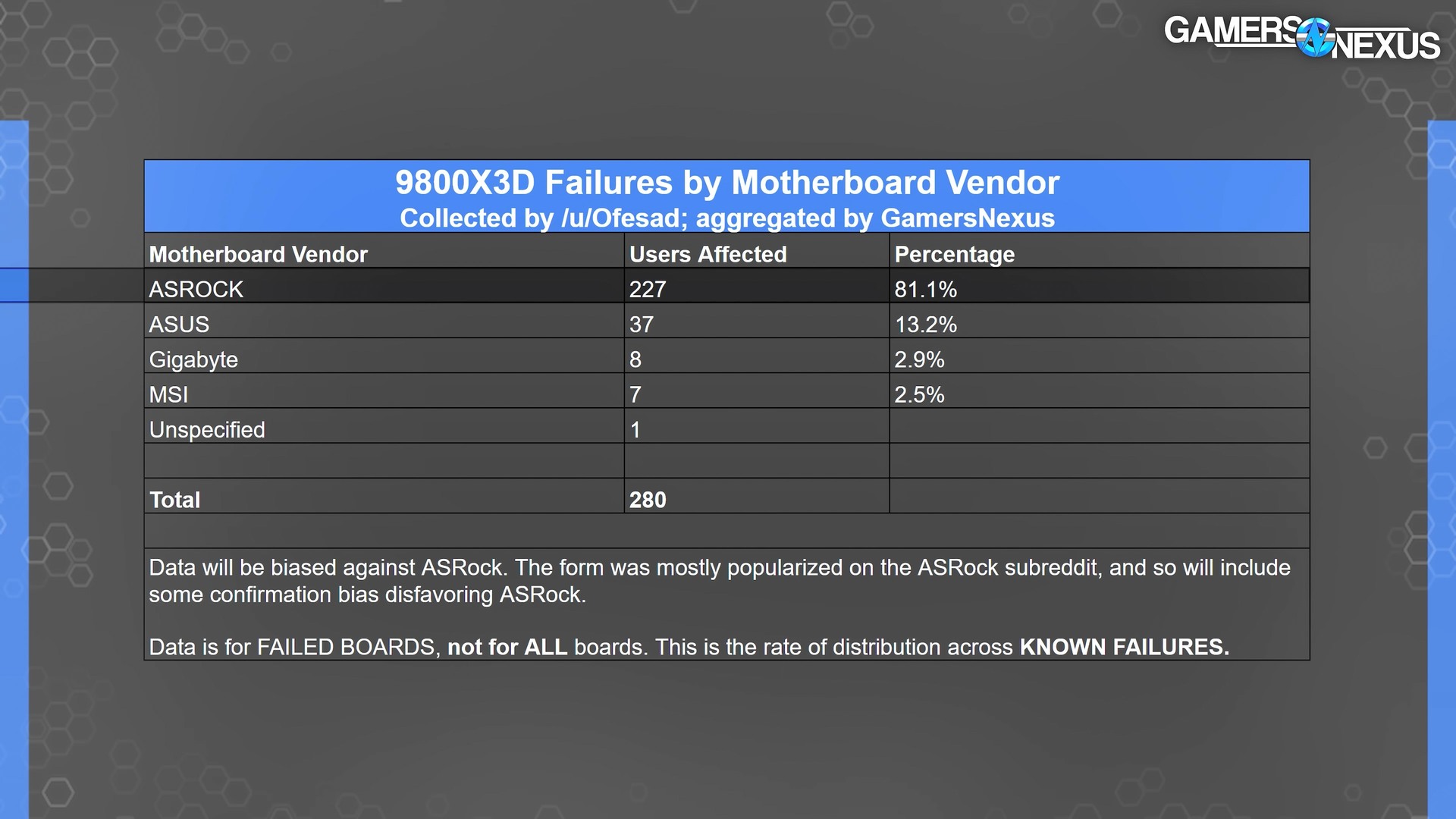The same ASRock B850 motherboard kills three Ryzen 7 9700X CPUs worth $1,000 one by one in South Korea — victim used updated BIOS and never overclocked, but still lost all their processors
The motherboard was declared healthy before killing off the last CPU.

ASRock has garnered borderline notoriety status because its motherboards keep killing off Ryzen 9000 processors. Throughout the year, we've seen various reports stemming from the r/ASRock subreddit detailing CPU after CPU hitting permanent sleep mode, with the company performing damage control to the best of its abilities. At least, up until now, the issue was largely reserved for X3D chips; now, one unlucky user reports that their ASRock motherboard killed off not one, not two, but three separate regular AMD CPUs.
User "OnOr" on the popular South Korean forum QuasarZone aired out their grievances after three Ryzen 7 9700X CPUs were all fried by their ASRock B850 Pro RS motherboard one by one. The first two 9700X chips were bought from AliExpress, and both failed in a row. The owner sent their motherboard in for service, reasonably suspecting a motherboard fault, but local retailer Compuzone (through ASRock) deemed it faultless, so the journey continued.

The victim then purchased a third 9700X, this time from an official distributor in South Korea to ensure the chips weren't dodgy, and guess what? It failed as well. That's an impressive kill streak for just one motherboard that was seemingly fine when diagnosed earlier. The user has since sent the dead 9700X and the ASRock B850 Pro RS to Compuzone, awaiting instructions on next steps.
This incident adds to the ever-increasing line of issues with ASRock's AM5 motherboard running Ryzen 9000 series processors. Other manufacturers aren't without issues, but Gamers Nexus has previously reported that over 80% of the complaints stem from ASRock, clearly isolating the brand from the rest. ASRock has so far largely denied responsibility outside of indirect statements, even initially pointing fingers at AMD, which just pointed them back.

ASRock released BIOS version 3.40 a few months ago to potentially address these issues, mentioning CPU stability and the like throughout the changelog, subtly hinting at the processor frying debacle without admitting anything, but it seems like that wasn't enough. Our victim always kept their BIOS updated, never overclocked or touched EXPO, and even said the board was running version 3.40 when issues started to occur.
There were no photos shared of this massacre, so we can't speculate much on what happened, but the pattern is quite clear. The Ryzen 7 9700X launched at $359 worldwide but can be had for a little less than that in Korea at the moment, meaning the victim has lost roughly $1,000 worth of CPUs in the span of a few months. ASRock has extended motherboard warranties in Japan, but that offer doesn't extend around the globe, which could imply a fourth CPU is for our OP. Hopefully, the RMA process comes in clutch and helps out before that.

Follow Tom's Hardware on Google News, or add us as a preferred source, to get our latest news, analysis, & reviews in your feeds.
Get Tom's Hardware's best news and in-depth reviews, straight to your inbox.

Hassam Nasir is a die-hard hardware enthusiast with years of experience as a tech editor and writer, focusing on detailed CPU comparisons and general hardware news. When he’s not working, you’ll find him bending tubes for his ever-evolving custom water-loop gaming rig or benchmarking the latest CPUs and GPUs just for fun.
-
Stomx Notice that not a single case from Gigabyte?Reply
And I was thinking why it was so difficult to upgrade their BIOS. :) Instead of do that in 1-2 clicks there were 15 pages of instructions with missing details, 100 different abbreviations without their explanation and at the end missing the file which launch the BIOS update. I saw video where guy to launch update uses this file from older BIOS. My processor was different than in this article but from the same AMD. I was not able to do that for couple weeks -
ThatMouse At least your build is slightly easier when ASRock, ASUS, and Intel are a don't buy.Reply -
DS426 ASUS and now ASRock. MSI and Sapphire, are you going to make the same mistake??Reply
I've seen this tons of times with various hardware and software vendors: they test in an ideal or mostly ideal lab environment, not accounting for real-world conditions -- even if uncommon or rare (but not exceptional as in only a handful of people in the world have certain adverse conditions). Of course, Grandpa will say "they don't make 'em like they used to" and would be correct as 1) tolerances are tighter and there's more resources put into failure engineering, usually making 2) planned obsolescence fairly predictable in most cases, and lastly 3) complexity adds more failure points. -
throughfire Reply
Not sure where you got the idea that not a single case is from Gigabyte. Did you look at the chart in the article from the Gamer's Nexus video showing 8 reported failures from Gigabyte? And that's only from data collected from a Google form in the ASrock subreddit, so probably not too many Gigabyte users there. The data is also at least a month old at this point.Stomx said:Notice that not a single case from Gigabyte?
And I was thinking why it was so difficult to upgrade their BIOS. :) Instead of do that in 1-2 clicks there were 15 pages of instructions with missing details, 100 different abbreviations without their explanation and at the end missing the file which launch the BIOS update. I saw video where guy to launch update uses this file from older BIOS. My processor was different than in this article but from the same AMD. I was not able to do that for couple weeks
As far as we can tell from the evidence we have (which is lacking), both Gigabyte and MSI have at least somewhat of a failure rate, if significantly lower than ASUS or especially ASrock. -
Stomx Reply
3% cases is zero. Though formally you are rightthroughfire said:Not sure where you got the idea that not a single case is from Gigabyte. Did you look at the chart in the article from the Gamer's Nexus video showing 8 reported failures from Gigabyte? And that's only from data collected from a Google form in the ASrock subreddit, so probably not too many Gigabyte users there. The data is also at least a month old at this point.
As far as we can tell from the evidence we have (which is lacking), both Gigabyte and MSI have at least somewhat of a failure rate, if significantly lower than ASUS or especially ASrock. -
TechieTwo FWIW - BIOS v3.50 for the B850 Pro RS has been out since 9/26/25. It may address some voltage issues often seen on new model release mobos. IME all the name brand mobos including Intel have had some issues over the past several decades so I don't see these issues as a one-brand/model issue.Reply
I used and recommended Gigabyte mobos for years building quite a few PCs and when AMD delivered the FX-8350 CPUs the Gigabytle mobo VRMs would overheat and go into limp mode. It took two years before Gigabyte came out with new mobos with proper VRM designs to handle the FX-8350 and higher current demand AMD CPUS. During that 2 year period Gigabyte told customers over and over that there were no problems yet the issue could be documented easily with a CPU stress test.
The only mobos that I have had fail in 30+ years of building PCs for Biz and personal use were Asus. So in my experience no brand is immune from issues from time to time. I agree they should do better but CPUs and mobos become more and more complex with each new iteration which is why it takes several BIOS updates to sort thru issues. -
throughfire Reply
It's very low, sure. But you said "not a single case from Gigabyte." Probably could have phrased that a little better.Stomx said:3% cases is zero. Though formally you are right
Beyond that, as an initial ASrock /9800X3D owner who has now lost one CPU and switched to an ASUS board (would have gone MSI or Gigabyte but there aren't a ton of ITX options out there), I would say all of these stats are a little high for comfort as far as I'm concerned. -
User of Computers "hey, my CPU got eaten by my motherboard for the second time. I'm just going to replace it again and gee whiz I hope nothing bad happens to it!".Reply
Motherboards shouldn't kill CPUs, but not getting a different one after the first 2 CPUs died is an... interesting choice. -
BROKEN 81 Reply
I only buy Asus and never had an issueThatMouse said:At least your build is slightly easier when ASRock, ASUS, and Intel are a don't buy. -
Heat_Fan89 Gamers Nexus did an episode on ASRock motherboards and how they were killing Ryzen CPU's. He met with ASRock higher ups and they told him on camera they thought most of the problems were user related and also due to memory configurations. Burke said later that he was skeptical after his interview with ASRock officials.Reply
He thought that the problem was not resolved. Apparently it isn't.